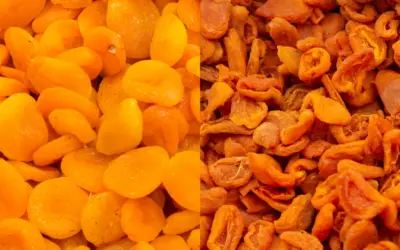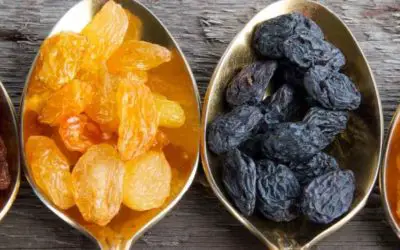
Is Eating Dried Fruit Healthy?
Dried fruits are versatile snacks to consume, as they are small, convenient, long-lasting and can be added to just about anything for some sweetness. Dried fruits also contain high amounts of fiber, vitamins, and minerals. However, are they as healthy as fresh fruit since they are preserved fruits? This article aims to address that question.
Background
Dried fruits have been enjoyed by people of the past. For example, dried apricots were used in Persian and Arab cultures thousands of years ago. In North America, dried fruits were added to pemmican, which is a mix of dried meat and melted fat. They were food for travelers in the 19th century as they could last long without going rancid.
Dried fruits can be made by drying under the sun, to remove moisture from the fruits. However, it is a time-consuming process. You can also read our blog on how you can make your own dried fruits at home, using an oven. You may also use a fruit dehydrator, which is a faster and modern process.
Pros
Dried fruits contain more nutrients, because although the moisture is evaporated from the fruit, the nutrients remain. Hence, dried fruits are more nutrient dense. In fact, dried fruits contain 3.5 times the fiber, vitamins, and minerals of fresh fruit. For instance, dried apricots contain high amounts of iron. One cup of dried apricot contains 3.5 mg of iron, which is necessary for the health of pregnant mothers as they are at a risk of developing anemia. Hence, dried fruits are beneficial for health due to their higher quantities of nutrients which is beneficial for different needs.
Dried fruits contain more fiber and polyphenol antioxidants. For instance, dried apricots have twice as much fiber as fresh apricots. Fiber is needed to clean the gut and prevent constipation. It is also needed to fight against heart illness and obesity. As for polyphenol antioxidants, it aids in the digestive system, decreases oxidative damage, promotes blood flow, and reduces the risk of diseases.
Comparison of raisins and grapes
Nutritional information of raisins per 100 g:
Protein: 3 g
Fat: 1 g
Carbohydrates: 62 g
Fiber: 3 g
Nutritional information of grapes per 100 g:
Protein: 1 g
Fat: Insignificant
Carbohydrates: 16 g
Fiber: 1 g
From the nutritional information, we can see that raisins benefit in terms of having more protein and fiber. However, they also lose out as they have more fats and carbohydrates, which translates into higher calories.
Raisins provide some health benefits; they contain fiber that reduces constipation and potassium that promotes heart health. Raisins also contain a mineral called boron that fights against tooth decay and cavities. They also have antimicrobial properties that prevents the growth of oral bacteria. The glycemic index value of raisins is low to medium, meaning that consuming them should not cause spikes in blood sugar levels. Hence, raisins may control blood sugar levels and lower blood pressure, as well as decrease cholesterol levels. These effects may ultimately reduce the risk of developing type 2 diabetes and heart illness. Hence, eating dried fruits such as raisins are beneficial for health.
Cons
In the same way that the drying process leaves behind nutrients, it also leaves behind natural sugar. As such, dried fruits contain high amounts of fructose and glucose, which increases the calorie intake. Raisins for example, contains 84 calories per 28 g. These calories come mostly from the sugar content. Hence, consuming high amounts of dried fruits is not advisable as they are high in calories and could lead to weight gain.
Tip:
Dried fruits are beneficial for those who need to gain weight and receive more nutrients, such as the elderly as the dried fruits can help to increase one’s calorie intake.
It is recommended to consume dried fruits with food rich in proteins such as nuts, seeds, and yoghurt because these foods can help to curb your appetite and prevent you from snacking on dried fruits too much. Protein rich food may also slow down the release of the natural sugars, helping to maintain blood glucose levels.
Conclusion
The key takeaway to consuming dried fruits is to monitor your intake. This is because dried fruits are small and addictive, which makes it easier to consume 20 pieces of raisins compared to 20 pieces of grapes. Hence, you should always consume dried fruits in moderation, but they are especially beneficial for those who need more nutrients and weight gain.






